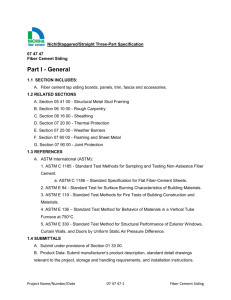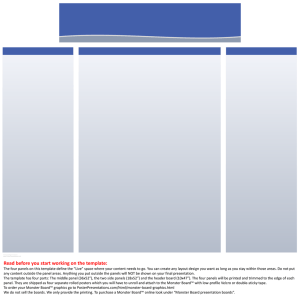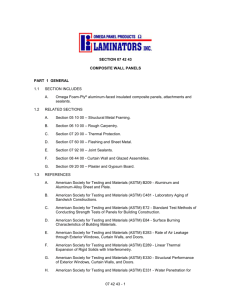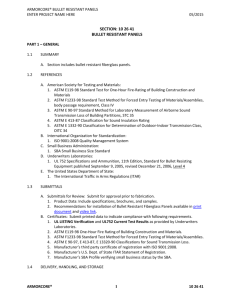Part I - General
advertisement
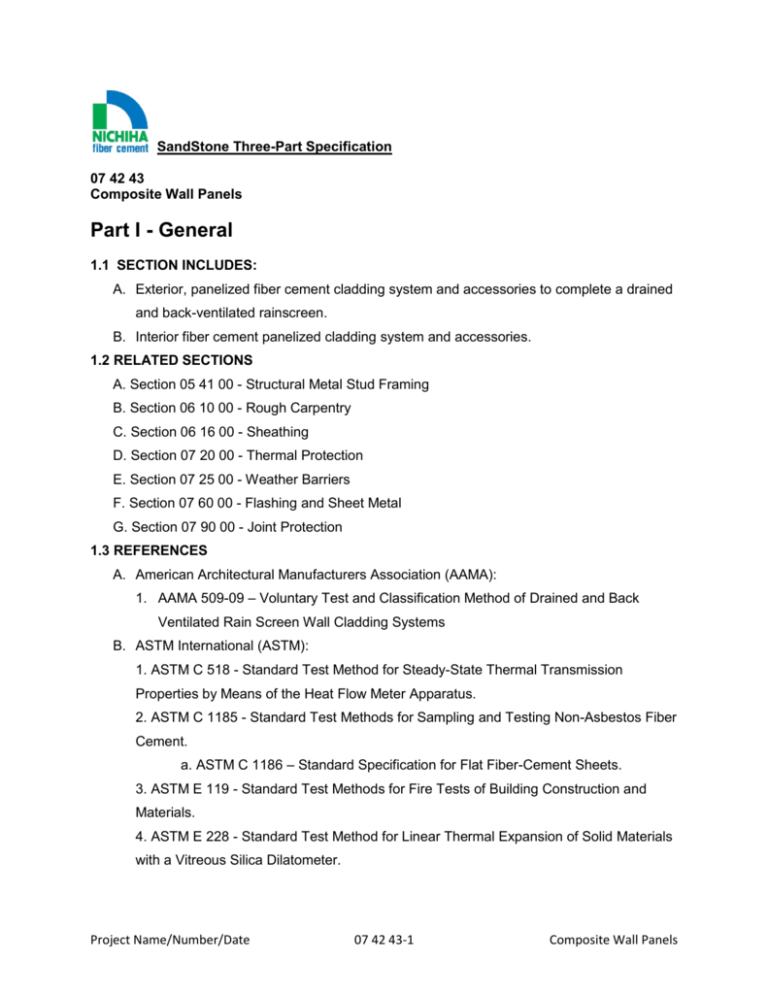
SandStone Three-Part Specification 07 42 43 Composite Wall Panels Part I - General 1.1 SECTION INCLUDES: A. Exterior, panelized fiber cement cladding system and accessories to complete a drained and back-ventilated rainscreen. B. Interior fiber cement panelized cladding system and accessories. 1.2 RELATED SECTIONS A. Section 05 41 00 - Structural Metal Stud Framing B. Section 06 10 00 - Rough Carpentry C. Section 06 16 00 - Sheathing D. Section 07 20 00 - Thermal Protection E. Section 07 25 00 - Weather Barriers F. Section 07 60 00 - Flashing and Sheet Metal G. Section 07 90 00 - Joint Protection 1.3 REFERENCES A. American Architectural Manufacturers Association (AAMA): 1. AAMA 509-09 – Voluntary Test and Classification Method of Drained and Back Ventilated Rain Screen Wall Cladding Systems B. ASTM International (ASTM): 1. ASTM C 518 - Standard Test Method for Steady-State Thermal Transmission Properties by Means of the Heat Flow Meter Apparatus. 2. ASTM C 1185 - Standard Test Methods for Sampling and Testing Non-Asbestos Fiber Cement. a. ASTM C 1186 – Standard Specification for Flat Fiber-Cement Sheets. 3. ASTM E 119 - Standard Test Methods for Fire Tests of Building Construction and Materials. 4. ASTM E 228 - Standard Test Method for Linear Thermal Expansion of Solid Materials with a Vitreous Silica Dilatometer. Project Name/Number/Date 07 42 43-1 Composite Wall Panels 5. ASTM E 330 - Standard Test Method for Structural Performance of Exterior Windows, Curtain Walls, and Doors by Uniform Static Air Pressure Difference. 6. ASTM E 331 - Standard Test Method for Water Penetration of Exterior Windows, Curtain Walls, and Doors by Uniform Static Air Pressure Difference. 7. ASTM G 23 - Standard Practice for Operating Light-Exposure Apparatus (Carbon-Arc Type) with and without Water for Exposure of Nonmetallic Materials, Replaced by G152 and G153. C. Florida Building Code - Test Protocol HVHZ 1. Testing Application Standard (TAS) 201, 202, 203 – Impact Test Procedures D. Underwriters Laboratories (UL): 1. UL 723/ASTM E-84 - Standard Test for Surface Burning Characteristics of Building Materials. 1.4 SUBMITTALS A. Submit under provisions of Section 01 33 00. B. Product Data: Submit manufacturer’s product description, standard detail drawings relevant to the project, storage and handling requirements, and installation instructions. C. Product Test Reports and Code Compliance: Documents demonstrating product compliance with local building code, such as test reports or Evaluation Reports from qualified, independent testing agencies. D. LEED Credits: Provide documentation of LEED Credits for project certification under USGBC LEED 2009 (Version 3.0). E. Shop Drawings: Submit drawings, including plan, section, and elevation drawings, showing installation details that demonstrate product layout, dimensions, finish colors, edge/termination conditions/treatments, compression and control joints, openings, and penetrations. F. Samples: Submit samples of each product type proposed for use. 1.5 QUALITY ASSURANCE A. Manufacturer Qualifications: 1. All fiber cement panels specified in this section must be supplied by a manufacturer with a minimum of 10 years of experience in fabricating and supplying fiber cement cladding systems. a. Products covered under this section are to be manufactured in an ISO 9001 certified facility. Project Name/Number/Date 07 42 43-2 Composite Wall Panels 2. Provide technical and design support as needed regarding installation requirements and warranty compliance provisions. B. Installer Qualifications: All products listed in this section are to be installed by a single installer trained by manufacturer or representative. C. Mock-Up Wall: Provide a mock-up wall as evaluation tool for product and installation workmanship. D. Pre-Installation Meetings: Prior to beginning installation, conduct conference to verify and discuss substrate conditions, manufacturer’s installation instructions and warranty requirements, and project requirements. 1.6 DELIVERY, STORAGE, AND HANDLING A. Panels must be stored flat and kept dry before installation. A waterproof cover over panels and accessories should be used at all times prior to installation. B. If panels are exposed to water or water vapor prior to installation, allow to completely dry before installing. Failure to do so may result in panel shrinkage at ship lap joints, and such action may void warranty. C. Panels MUST be carried on edge. Do not carry or lift panels flat. Improper handling may cause cracking or panel damage. D. Direct contact between the panels and the ground should be avoided at all times. It is necessary to keep panels clean during installation process. 1.7 WARRANTY A. Provide manufacturer’s 50-year warranty against manufactured defects in fiber cement panels. B. Provide manufacturer’s 15-year warranty against manufactured defects in panel finish. C. Warranty provides for the original purchaser. See warranty for detailed information on terms, conditions and limitations. PART II: PRODUCTS 2.1 MANUFACTURERS A. Acceptable Manufacturer: Nichiha Corporation, 18-19 Nishiki 2-chome Naka-ku, Nagoya, Aichi 460-8610, Japan. B. Acceptable Manufacturer’s Representative: Nichiha USA, Inc., 6465 E. Johns Crossing, Suite 250, Johns Creek, GA 30097. Toll free: 1.866.424.4421, Office: 770.805.9466, Fax: 770.805.9467, www.nichiha.com. Project Name/Number/Date 07 42 43-3 Composite Wall Panels 1. Basis of Design Product: Nichiha SandStone. a. Profile colors: Autumn Brown, Desert Beige, Gentle Gray. i. Panel color(s): b. Profile: Sandstone block texture with 1/4” wide vertical score line at panel midpoint. c. Optional Accessories: i. Manufactured corners with 3-1/2” returns for each profile color. ii. Aluminum trim to be painted per finish schedule. d. Dimensions: Nominal - 18” (h) x 6’ (l); Actual - 455mm (h) x 1,818 mm (l). e. Panel Thickness: 3/4 inch (18 mm actual). f. Weight: 39.68 lbs. per panel (6’). g. Coverage: 9 sq. ft. per panel (6’). h. Factory sealed on six [6] sides. C. Substitutions: Not permitted. D. Requests for substitutions will be considered in accordance with provisions of Section 01 60 00. 2.2 MATERIALS A. Fiber cement panels manufactured from a pressed, stamped, and autoclaved mix of Portland cement, fly ash, silica, recycled rejects, and wood fiber bundles. B. Panel surface pre-finished and machine applied. C. Panels profiled along all four edges, such that both horizontal and vertical joints between the installed panels are ship-lapped. D. Factory-applied sealant gasket added to top and right panel edges; all joints contain a factory sealant. 2.3 PERFORMANCE REQUIREMENTS: A. Fiber Cement Cladding – Must comply with ASTM C-1186, Type A requirements: 1. Linear Variation with Change in Moisture Content: 0.17% linear change. 2. Wet Flexural Strength, lower limit: 580 psi. 3. Water Tightness: No water droplets observed on any specimen. 4. Freeze-thaw: No damage or defects observed. 5. Warm Water: No evidence of cracking, delamination, swelling, or other defects observed. Project Name/Number/Date 07 42 43-4 Composite Wall Panels 6. Heat-Rain: No crazing, cracking, or other deleterious effects, surface or joint changes observed in any specimen. B. Mean Coefficient of Linear Thermal Expansion (ASTM E-228): Max 1.0*10^-5 in./in. F. C. Surface Burning (UL 723/ASTM E-84): Flame Spread: 0, Smoke Developed: 5. D. Wind Load (ASTM E-330): Refer to manufacturer installation guidelines for ultimate test pressure data corresponding to framing dimensions, fastener type, and attachment clips. Project engineer(s) must determine Zone 4 and 5 design pressures based on project specifics. 1. Minimum lateral deflection: L/120. E. Water Penetration (ASTM E-331): No water leakage observed into wall cavity. F. Weather Resistant (ASTM G-23): No cracking, checking, crazing, erosion, or other detrimental effects observed. G. Steady-State Heat Flux and Thermal Transmission Properties Test (ASTM C-518): thermal resistance R Value of 1.23. H. Fire Resistant (ASTM E-119): The wall assembly must successfully endure 60-minute fire exposure without developing excessive unexposed surface temperature or allowing flaming on the unexposed side of the assembly. I. Drained and Back Ventilated Rainscreen (AAMA 509-09): System must pass all component tests. J. Florida Building Code - Test Protocol HVHZ (TAS 201, 202, 203): Passed. 2.4 INSTALLATION COMPONENTS A. Ultimate Clip System: 1. Starter Track: FA 700 (10mm rainscreen) – 10’ (l) galvalume. 2. Panel Clips: JEL 787 “Ultimate Clip” (10mm rainscreen for 3/4” AWP) – 400 series stainless steel. a. Joint Tab Attachments (included). 3. Single Flange Sealant Backer – FHK 1017 (10mm) – 6.5’ (l) fluorine coated galvalume. 4. Double Flange Sealant Backer – FH 1020 (10mm) – 10’ (l) fluorine coated galvalume. 5. Corrugated Spacer – FS 1005 (5mm), FS 1010 (10mm) – 4’ (l). 6. Finish Clip (optional) – JE310 (5mm) B. Aluminum Trim (optional): Paint as specified in finish schedule. Project Name/Number/Date 07 42 43-5 Composite Wall Panels C. Fasteners: Corrosion resistant fasteners, such as hot-dipped galvanized screws appropriate to local building codes and practices must be used. Use Stainless Steel fasteners in high humidity and high-moisture regions. Panel manufacturer is not liable for corrosion resistance of fasteners. Do not use aluminum fasteners, staples, or fasteners that are not rated or designed for intended use. See manufacturer’s instructions for appropriate fasteners for construction method used. D. Flashing: Flash all areas specified in manufacturer’s instructions. Do not use raw aluminum flashing. Flashing must be galvanized, anodized, or PVC coated. E. Sealant: Sealant shall be polyurethane, or hybrid, and comply with ASTM C920. PART III: EXECUTION 3.1 EXAMINATION A. Verification of Conditions: 1. Fiber cement panels can be installed over braced wood, steel studs and sheathing including plywood, OSB, plastic foam or fiberboard sheathing. Fiber cement panels can also be installed over Structural Insulated Panels (SIP’s), Concrete Masonry Units (CMU’s) and Concrete Block Structures (CBS’s) with furring strips, and Pre-Engineered Metal Construction. 2. Allowable stud spacing: See manufacturer’s installation instructions for details. 3. A weather resistive barrier is required when installing fiber cement panels. Use an approved weather resistive barrier (WRB) as defined by the 2012 IRC. Refer to local building codes. 4. Appropriate metal flashing should be used to prevent moisture penetration around all doors, windows, wall bottoms, material transitions and penetrations. Refer to local building codes for best practices. B. Examine site to ensure substrate conditions are within specification for proper installation. C. Do not begin installation until unacceptable conditions have been corrected. D. Do not install panels or components that appear to be damaged or defective. Do not install wet panels. 3.2 INSTALLATION A. General: Install products in accordance with the latest installation guidelines of the manufacturer and all applicable building codes and other laws, rules, regulations and ordinances. Review all manufacturer installation, maintenance instructions, and other applicable documents before installation. Project Name/Number/Date 07 42 43-6 Composite Wall Panels 1. Consult with your local dealer or Nichiha Technical Department before installing any Nichiha fiber cement product on a building higher than 45 feet or three stories. Special installation conditions may be required. B. Panel Cutting 1. Always cut fiber cement panels outside or in a well ventilated area. Do not cut the products in an enclosed area. 2. Always wear safety glasses and NIOSH/OSHA approved respirator whenever cutting, drilling, sawing, sanding or abrading the products. Refer to manufacturer MSDS for more information. 3. Use a dust-reducing circular saw with a diamond-tipped or carbide-tipped blade. a. Recommended circular saw: Makita 7-1/4” Circular Saw with Dust Collector (#5057KB). b. Recommended blade: Tenryu Board-Pro Plus PCD Blade (#BP-18505). c. Shears (electric or pneumatic) or jig saw can be used for complicated cuttings, such as service openings, curves, radii and scrollwork. 4. Silica Dust Warning: Fiber cement products may contain some amounts of crystalline silica, a naturally occurring, potentially hazardous mineral when airborne in dust form. Consult product MSDS or visit www.osha.gov/SLTC/silicacrystalline/index.html. 3.3 CLEANING AND MAINTENANCE A. Review manufacturer guidelines for detailed care instructions. Project Name/Number/Date 07 42 43-7 Composite Wall Panels
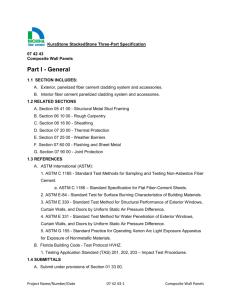
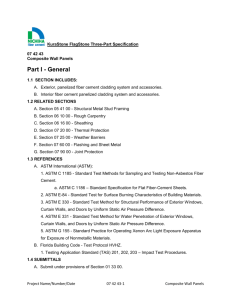
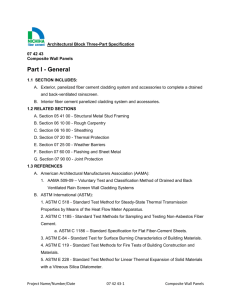
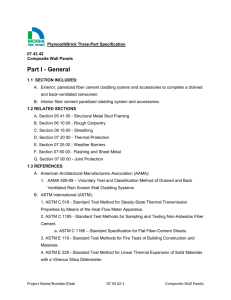
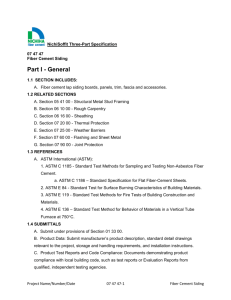
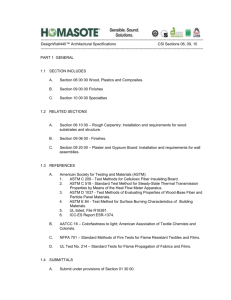
![EQUITONE [tectiva] CSI Specification](http://s3.studylib.net/store/data/007008850_1-cf0ef0a6b2bc7e1b58eba8714688fb0b-300x300.png)
